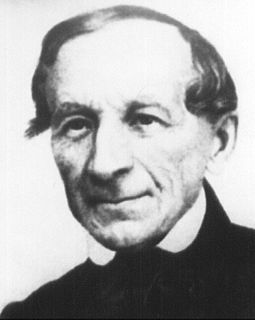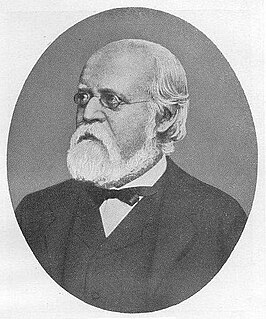Johann Christian Friedrich Tuch (17 December 1806 – 12 April 1867) was a German Orientalist and theologian born in Quedlinburg.

Oriental studies is the academic field of study that embraces Near Eastern and Far Eastern societies and cultures, languages, peoples, history and archaeology; in recent years the subject has often been turned into the newer terms of Middle Eastern studies and Asian studies. Traditional Oriental studies in Europe is today generally focused on the discipline of Islamic studies, while the study of China, especially traditional China, is often called Sinology. The study of East Asia in general, especially in the United States, is often called East Asian studies, while the study of Israel and Jews are called Israel studies and Jewish studies respectively, although they are often considered the same field.

Quedlinburg is a town situated just north of the Harz mountains, in the district of Harz in the west of Saxony-Anhalt, Germany. In 1994, the castle, church and old town were added to the UNESCO World Heritage List.
He studied at the University of Halle, where in 1830 he received his habilitation. In 1838 he became an associate professor, later relocating to the University of Leipzig, where from 1844 to 1867, he was a full professor of theology and Oriental studies. In 1856–58 he served as university rector.
Habilitation defines the qualification to conduct self-contained university teaching and is the key for access to a professorship in many European countries. Despite all changes implemented in the European higher education systems during the Bologna Process, it is the highest qualification level issued through the process of a university examination and remains a core concept of scientific careers in these countries.

A rector is a senior official in an educational institution, and can refer to an official in either a university or a secondary school. Outside the English-speaking world the rector is often the most senior official in a university, whilst in the United States the most senior official is often referred to as President and in the United Kingdom and Commonwealth of Nations the most senior official is the Chancellor, whose office is primarily ceremonial and titular. The term and office of a rector can be referred to as a rectorate. The title is used widely in universities in Europe. and is very common in Latin American countries. It is also used in Brunei, Turkey, Russia, Pakistan, the Philippines, Indonesia, Israel and the Middle East. In the ancient universities of Scotland the office is sometimes referred to as Lord Rector, is the third most senior official, and is usually responsible for chairing the University Court.
















